
What to Do With Your Cultures While You’re on Vacation
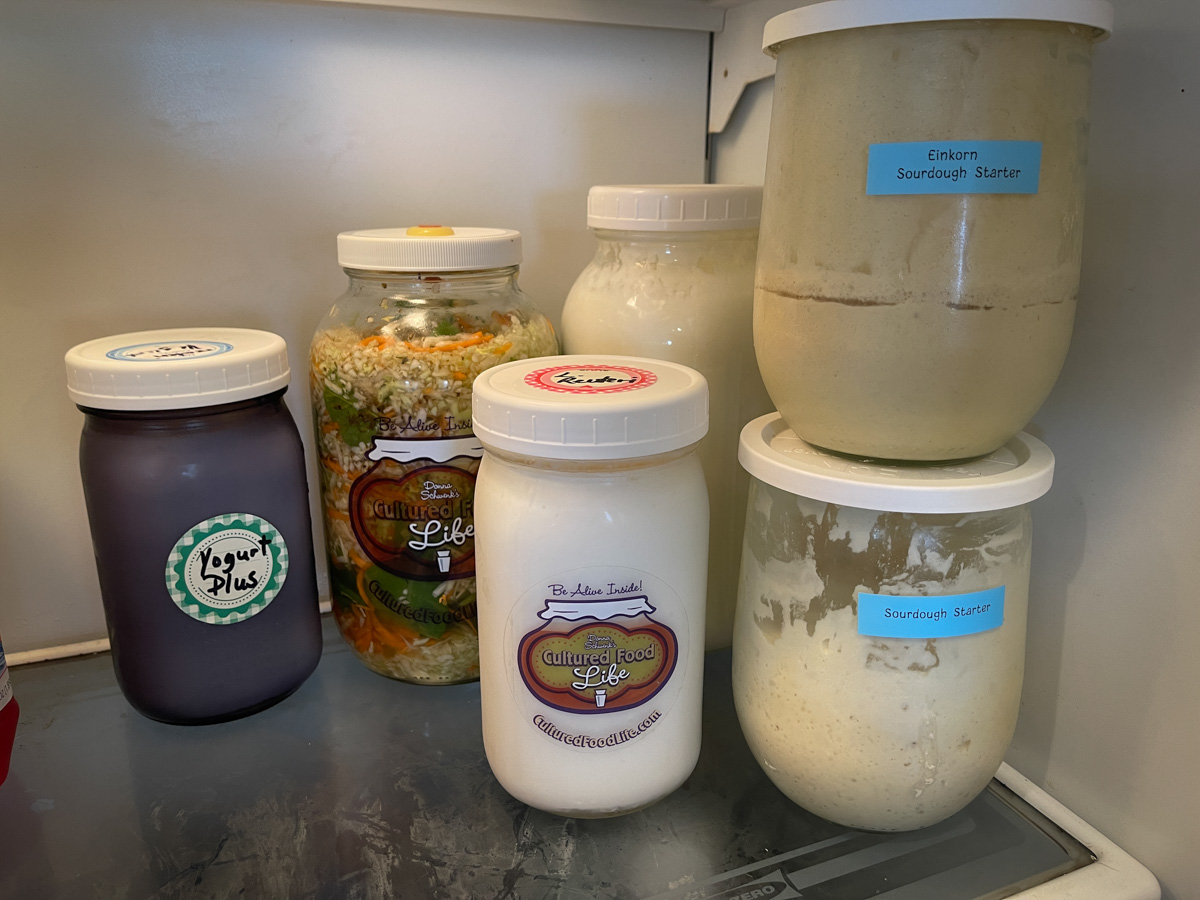
Your cultures (kefir, kombucha, sourdough, yogurts, kefir soda, and water kefir) are all living organisms and need to be cared for just like a pet. I love them like family, and have found ways to take care of them when I go on vacation. The good microbes in the cultures eat the sugars out of the cultures, and you want to be sure they have plenty to eat so the cultures won’t die. They are living colonies of microbes and need food, just as you do. Here are the cultures and how you can store them for limited amounts of time.
Storing Your Cultures
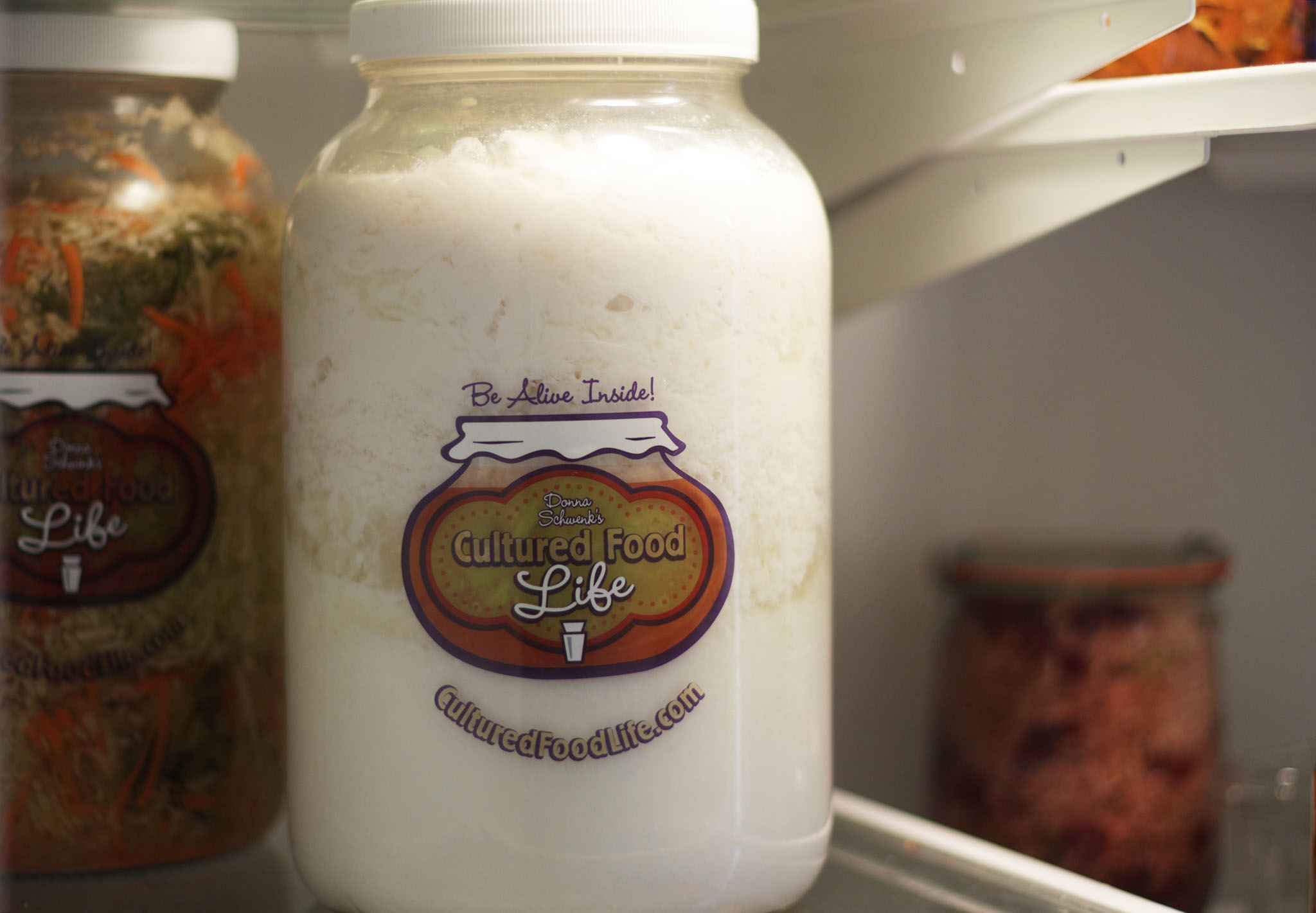

Milk Kefir Grains
Storing kefir grains for a week: Place your kefir grains in milk. If you have 1 tablespoon of grains, store them in at least 2 cups of milk, 3 cups would be better. I like to make sure that they have plenty of food to eat. If you have more grains, add more milk accordingly. Then you place this in the refrigerator. This will last for one week. Coming home: When you return home, strain off the milk that the grains were resting in and discard the milk (you can also give this to pets!) and put the grains in new milk to make kefir.
The grains will be a little slower making kefir when you first take them out of the fridge. The cold slows them down a bit, but the second time you make kefir they will be back up to speed.
Longer than a week: If you're going to be gone for more than one week, I recommend you freeze them in powdered milk. Place powdered milk in a rectangular food storage container after covering the bottom with powdered milk. Then place the grains in the powdered milk layer and sprinkle them with more powdered milk until they're completely covered in powdered milk. You can add a little milk if you want to cover them but it's not necessary. If you use a lot of powdered milk, the more the better. Cover the container with a secure lid. I use a rectangular food-grade storage container. You can use glass containers or plastic ones. Silicone containers will work too. The grains do diminish some when you freeze them, and the longer they are frozen, the more they diminish. So you will have a smaller amount of grains than you started with and this is normal.
You can store this for several months or up to a year if you have a lot of grains. However, you will have fewer grains when you recover them the longer you freeze them, but they do come back and grow again. They will take a little while to wake up when you remove them from the freezer. Once they thaw, strain them and give them fresh milk. After a few days of making kefir, they should be fine. You will need to discard the milk they were stored in. Freezing kefir grains should only be done once in a while. Freezing and thawing them continuously can diminish or kill them, but once or twice a year should be fine. When you thaw them, add a scoop of Prebio Plus to help them wake up. It may take longer than 24 hours to culture the first time with the added food from the Prebio Plus, but this will make a big difference in how they perform.
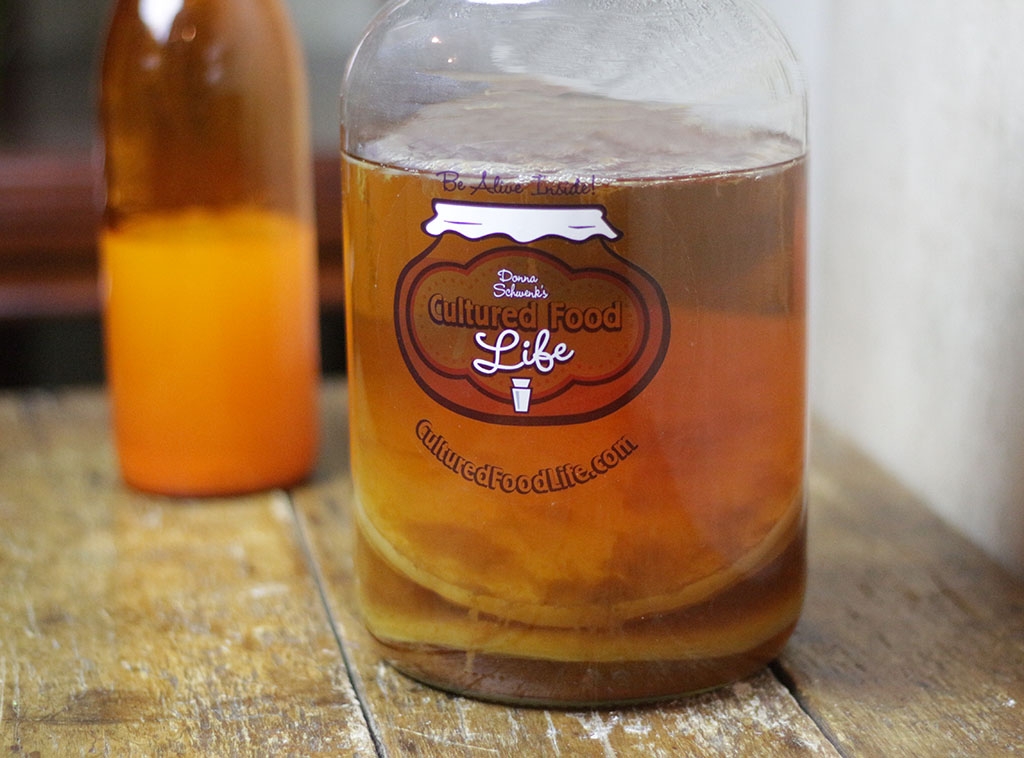

Kombucha Starter
Storing your kombucha and SCOBY for a week or month: Kombucha is one of the easiest ferments to store while on vacation. Make a fresh batch of kombucha with your SCOBY and keep it in a jar on your counter for up to a month. You can double the sugar in the recipe if you're going to be gone for several weeks.
Storing SCOBYs. You can store extra SCOBYs in a jar with a lid in starter tea (from the previous batch) using enough tea to cover the SCOBYs. Place on your counter for up to a month. Check out my SCOBY Hotel recipe:
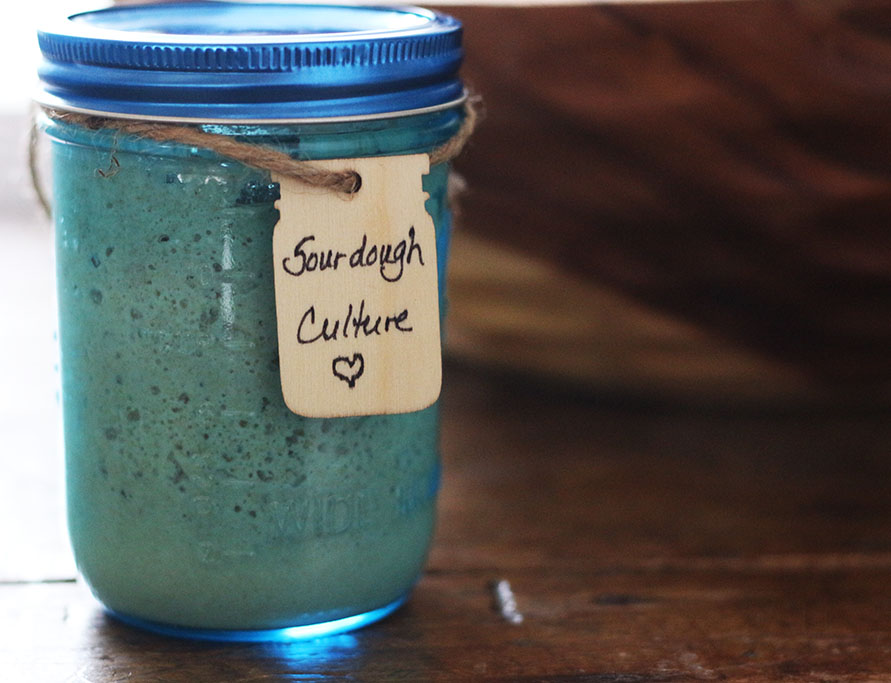

Sourdough Culture
Storing your sourdough starter for a week or two: If you are storing your sourdough starter in the refrigerator, you should feed it right before you leave. Make sure when feeding it to follow the correct ratios of 1-1-1. You should only use equal portions of flour, water, and starter. If you use too much starter, you won't have enough food for the starter. For instance, let's say you have 1/2 cup starter - then you need to feed it 1/2 cup flour and 1/2 cup water. If you have 1 cup starter than you need to feed it 1 cup water and 1 cup flour. If you don't want this much starter, discard some of the starter, use the remaining amount, and feed it equal portions of everything. This will last for a week before you need to feed it again. If you're going to be gone for longer than a week, then you'll need to double the amount of flour and water. This should last another week. When you return, feed it once in the morning and once at night for three days to revive it. It should then be strong and ready to use again to rise your bread.
Storing your sourdough starter for longer. Dehydrating your starter for longer storage is the best way to make sure you always have a sourdough starter.
Check out this recipe:
Dehydrating Your Sourdough Starter
Einkorn Sourdough
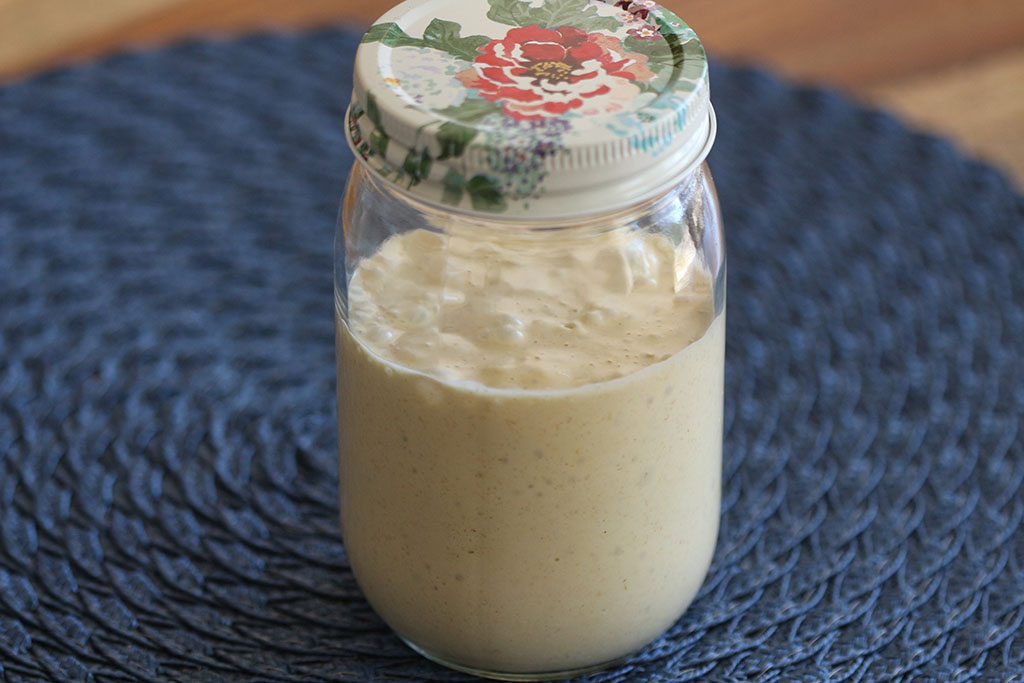
Einkorn can be stored in the same manner but with different ratios. So for a week of storage you want to:
1. Take the starter out of the fridge and measure out 2 teaspoons (10 grams) of the starter.
2. Add 1/4 cup (59 grams) of water.
3. Add ½ cup (60 grams) of All-Purpose Einkorn Flour OR ½ cup (48 grams) of Whole Wheat Einkorn Flour. Mix well. Einkorn flour absorbs water more slowly, so it will get wetter over time as it ferments.
If you will be gone longer, double the amounts of flour and water. You can also dehydrate it as in the link above for longer term storage.
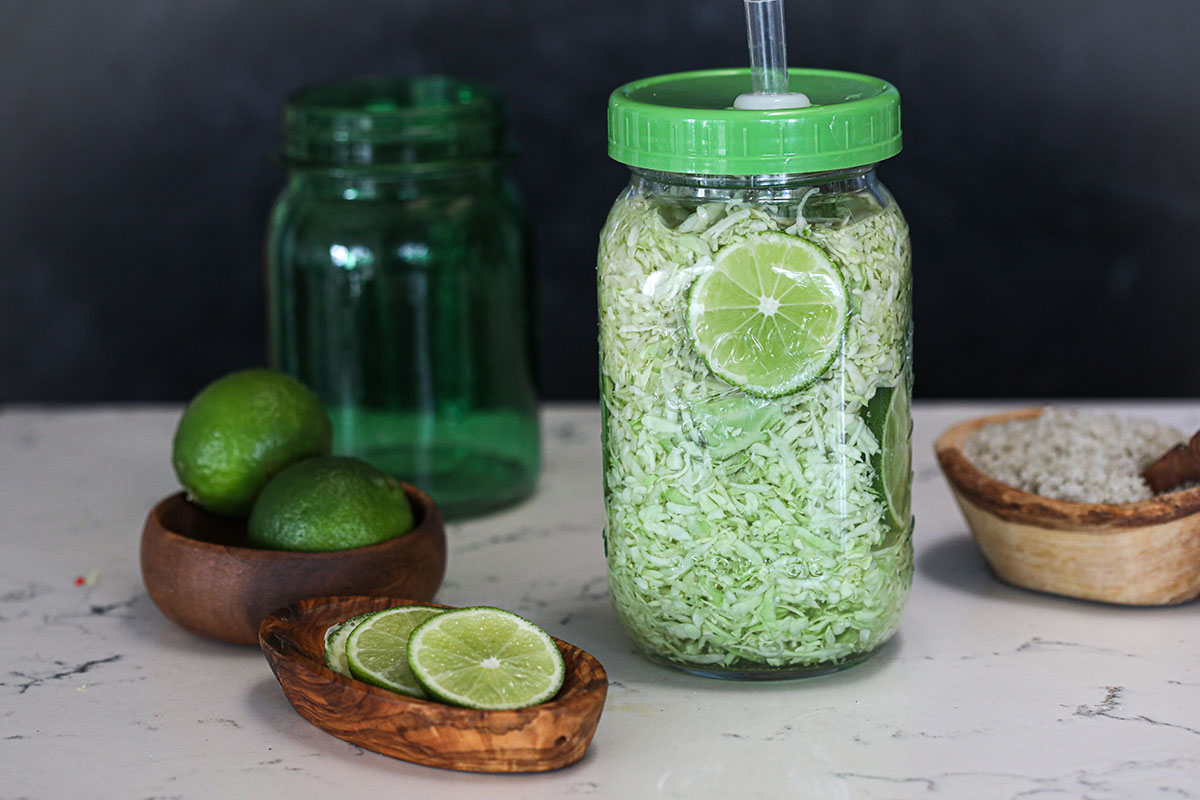

Cultured Vegetables
You should always store cultured vegetables in the refrigerator after fermentation. They can last up to nine months in the fridge and will age like a fine wine. It is one of the easiest cultured foods to store. They stay perfectly preserved in your fridge, as acidifying bacteria preserve the foods and keep out pathogens.
Remember they do this for you too when you consume them. They keep you preserved and healthy.
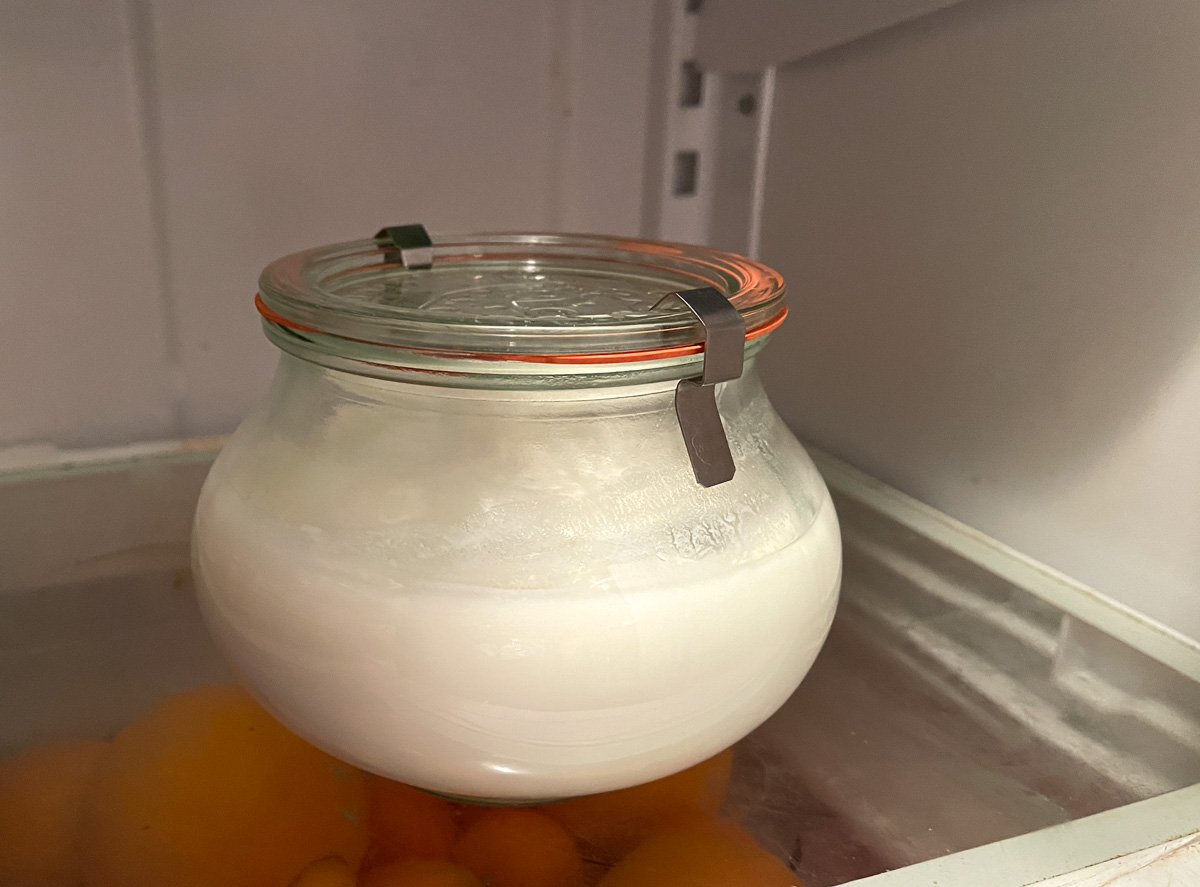

Yogurt
We have a lot of different yogurts and all of them stay for weeks stored in the fridge. L. reuteri, L. gasseri, Yogurt Plus, Bulgarian, and Greek yogurt will last three weeks to a month stored in the fridge. You should be able to reculture with them at about 3 weeks, although I have done it at a month and it worked too. The CFUs (colony forming units) may be diminished, but they should go back up once you add fresh milk and culture again.
Freezing
A lot of people want to freeze their yogurt and then thaw it to reculture with it. The live and active bacteria found in yogurt survive freezing by going dormant but it does diminish the probiotic count. I don't recommend freezing. This can greatly reduce its ability to reculture.


Kefir Soda
If you're going on vacation, then you need to drink all of your kefir soda. It is a very active culture. If you're not there to pop the top on the bottle and you are gone for a few days or longer, then it can explode in your fridge - especially if it is super active. This doesn't always happen, but it's just better to be safe than sorry if you were to leave it for a week or longer and not able to open it to expel the pressure.
Drink it before you go - this is easy to do because it is quite delicious!
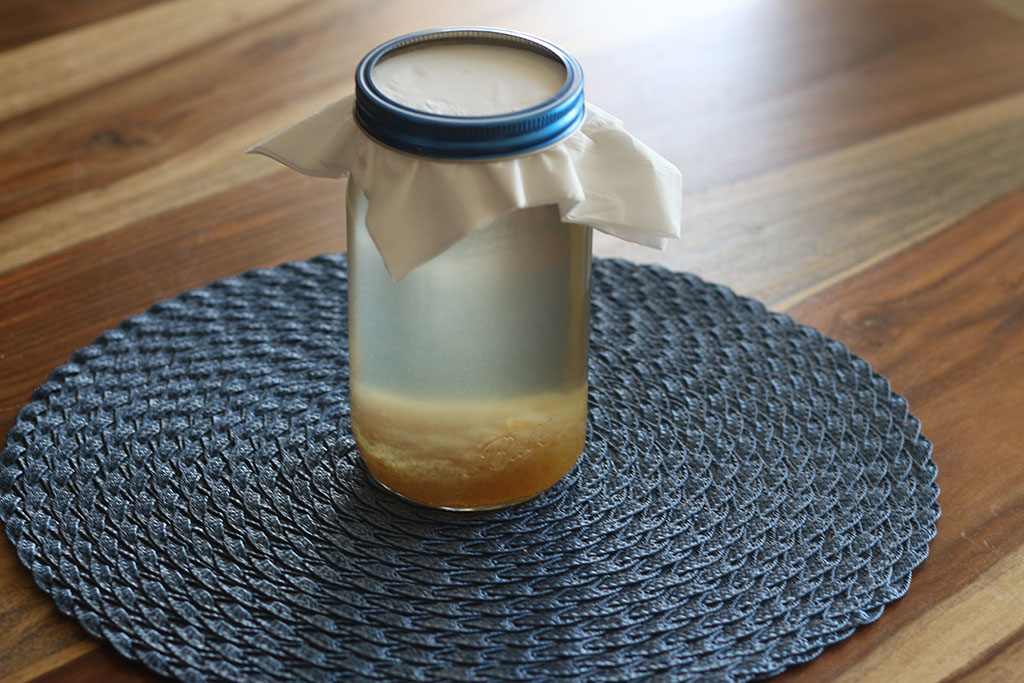

Water Kefir Crystals
Storing water kefir for one to two weeks. Prepare a sugar-water solution: for each 1/4 cup of water kefir grains, you will need to use 1/4 cup of sugar and one quart of water to make your sugar-water solution. (Just as you would if you were making a new batch).
If you have more grains, adjust accordingly by adding more sugar and increasing the water. So for instance, if you have 1/2 cup of grains, then add 1/2 cup of sugar and increase the water to 8 cups and so forth.
Place the grains in the sugar water, place a tight lid on the container, and place it in the refrigerator. This will keep for at least 2 weeks in your fridge.
Longer than two weeks: If you’re going to be gone for longer than two weeks, double the sugar. (No need to double the water.) When you return, strain your water kefir grains and discard the sugar water solution they were in, giving them fresh sugar water to make a new batch of water kefir. Your grains will be a little sluggish, but after a few feedings they will be up and working again. Giving them a little bit of molasses also helps (1 – 2 tablespoons per jar is perfect) and will keep your water kefir grains really happy!
Listen To My Podcast
Your cultures (kefir, kombucha, sourdough, and water kefir) are all living organisms and need to be cared for just like a pet. I love them like family and have found ways to take care of them when I go on vacation. I can teach you how to keep them thriving and healthy even when you're gone.
Are you on the list?
Sign up today and I'll send you my free Getting Started Guide!
Each week I'll send you updates, tips, recipes, and more! You might even be a winner of my weekly giveaway! (starter cultures, memberships, and more!)
Come be a part of my cultured food family!


